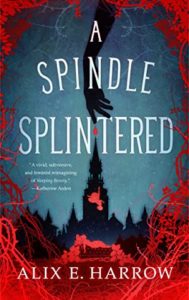“Sleeping Beauty is pretty much the worst fairy tale, an way you slice it” says Zinnia Gray, first-person narrator of A Spindle Splintered by Alix E. Harrow. She adds, “Only dying girls like Sleeping Beauty.” (p. 2) And there’s the first catch, because Zinnia Gray is dying, victim of a rare genetic defect, most of whose carriers die in their teens and none of whom has made it to age twenty-two. The novella opens on her twenty-first birthday.
Zinnia grins and bears it through a family birthday party that everyone pretends to believe isn’t a pre-wake. Her “best/only friend” (p. 2) Charm — Charmaine Baldwin — rescues the mood with a text that’s a request, a promise, and an omen: “meet me at the tower, princess.” (p. 4) The tower is a leftover guard tower from an abandoned state penitentiary. Charm has done up the highest room in the tower with “strings of pearled lights crisscrossing the ceiling and long swaths of blushing fabric draped over the windows; a dozen or so people wearing the kind of gauzy fairy wings that come from the year-round Halloween store at the mall; roses absolutely everywhere, bursting from buckets and mason jars and Carlo Rossi jugs. An in the very center of the room, looking dusty and rickety and somehow grand, a spinning wheel.” (p. 6) Twelve fairy godmothers, but they all drift off and eventually it’s just Zinnia and Charm. Near midnight, Zinnia dares Charm to prick her finger on the spindle. “You’re the princess, hon,” answers Charm. Zinnia tries to divert her with facts about the original version of Sleeping Beauty — she has a degree in folklore and “alcohol transforms me into a chatty Wikipedia page.” (p. 6) Zinnia takes the dare, though, pressing her finger onto the spindle. “And then something happens, after all.” (p. 8)
The world is still rushing past me, colors and sounds and flashing by like riffled pages. I assume at first this is the life-flashing-before-my-eyes thing, but it seems longer and stranger than the twenty-one years I’ve lived.
And the faces I see don’t belong to me. They belong to a thousand other girls reaching out toward a thousand spinning wheels or spindles or splinters. Other sleeping beauties, in other stories? I want to stop them, should some kind of warning—stop, you boneheads!
One of them seems to hear me. She looks up at me with eyes that are an impossible shade of cerulean, her face framed by locks of literal gold, her finger hovering a centimeter above the spindle’s end. Her lips frame a single word: “Help.”
The world stops spinning. (pp. 11–12)
Zinnia has landed in another Sleeping Beauty story, translated bodily through something she later decides is narrative congruity. In one of the novella’s many comic touches, the cellphone connection still works, and Zinnia wakes to find a series of increasingly frantic texts from Charm. She replies, “sorry babe. got spider-verse-ed into a fairy tale.” (p. 14) She has indeed. The person calling for help is Princess Primrose, and she does not want to sleep for a hundred years, nor is the most convenient prince her idea of true love. Zinnia wants to deliver her to a better story, and maybe get back to Ohio before her parents completely freak. She will get occasional help from Charm, but only for as long as her phone’s charge holds.
The rest of A Spindle Splintered is a romp through the fairy tale from a slightly fractured point of view. That characters trying to change their story is something that makes little sense — they will or they won’t, according to what Alix E. Harrow decided as she wrote the story — I was mostly able to ignore thanks to the fast pace and Zinnia’s narration that regularly drops phrases like “gallivanting through the multiverse without my meds.” (p. 29)
It’s fun and it’s fast and even though not much stuck with me, I still enjoyed reading the novella. I’m not the main audience for A Spindle Splintered, and that’s fine. Zinnia and Primrose have adventures, learn things about themselves and each other, and escape various things in the nick of time. Some things are not as they seem; others are; and it is not easy for the pair to tell them apart, even with occasional out-world assistance. There’s a happy ending, of course — it’s not that kind of a retelling. And there’s a promise of more.

